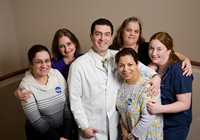NSMC News Releases
For years, primary care physicians have been the foundation of the healthcare system, serving as a patient’s trusted advisor and initial point of contact for all medical matters. This role will be further enhanced with the new Patient-Centered Medical Home (PCMH) care delivery model that NSPG practices are rolling out over the next 18 months.
 Dr. DaSilva was chosen as community primary care physician by Partners HealthCare in 2010
Dr. DaSilva was chosen as community primary care physician by Partners HealthCare in 2010Rapidly gaining acceptance on the national level, the medical home model is proven to improve clinical outcomes, expand access to care, enhance patient satisfaction and reduce healthcare costs. All Partners-affiliated primary care practices will transition to the PCMH model by 2013.
“This model offers an integrated approach to care that is led by the primary care provider, but also enlists an entire team that includes nurses, care managers, nutritionists, behavioral health specialists and pharmacists,” says Steven Kapfhammer, President of North Shore Physicians Group.
“Together, this group manages the patient’s care in a proactive manner, focusing on wellness and prevention.” The care, he adds, is facilitated through technology like electronic health records, allowing physicians to measure quality, determine best practices and closely track each patient’s care.
“Today, our interactions with patients tend to be episodic and illness-oriented,” says Maury McGough, M.D., President of North Shore Health System and herself a primary care physician practicing in Salem. “As a medical home, however, a team in our practice will actively reach out to the patient instead of waiting for them to come to us.”
To illustrate her point, Dr. McGough describes how a typical patient with diabetes will benefit from the new care model. “In our existing system, a patient with diabetes comes in once a year for a physical and then every three months to have a blood test. In the medical home model, this patient will do the same, but they will also meet with a nurse specialist between visits to discuss medications and lifestyle issues. This nurse will also be available by phone or email to answer questions.
This approach helps keep patients out of the hospital, which helps reduce everyone’s healthcare costs. As a primary care physician, there’s just no way I could ever provide this kind of attention to every single patient without the support of a team. The medical home offers better care in a more cost-effective manner.”
To prepare for the transition to the PCMH model, NSPG is doing a tremendous amount of work behind the scenes. “Getting our practices ready to meet the criteria set forth by the National Committee for Quality Assurance and other certifying agencies means major changes in the way we work,” says Sharon Lucie, NSPG Vice President of Operations.
These changes range from numerous process improvement projects—ensuring that the organization is run with maximum efficiency—to expanded training for all clinical staff. There is also work underway to improve access to care (including shared medical appointments and increased participation in the online Patient Gateway system); roll out new technologies to help assess, track and manage patients; and hire nurse care managers and behavioral health specialists.
“It’s an exceptionally busy time at NSPG, but it is also an exciting time because we are right out front,” says Lucie. “There is no question that the medical home model represents the very best way to deliver primary care. It’s the gold standard.”

